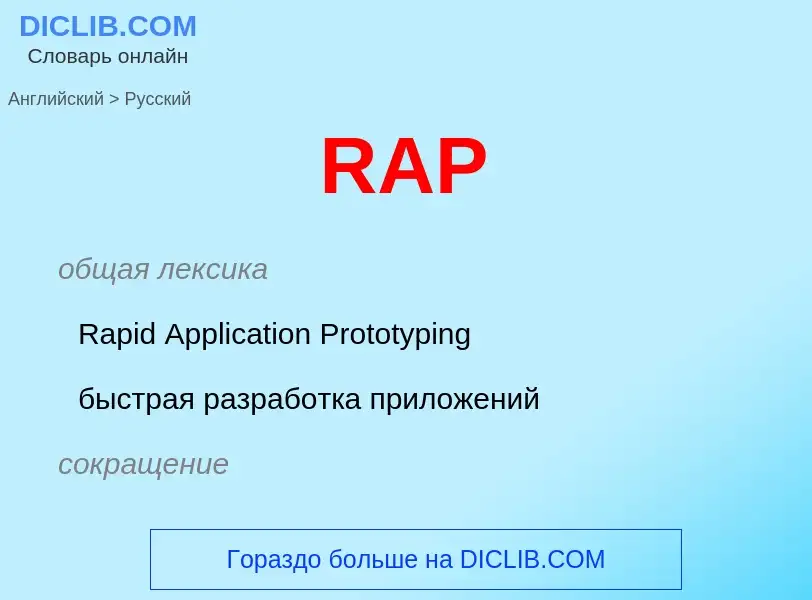Translation and analysis of words by ChatGPT artificial intelligence
On this page you can get a detailed analysis of a word or phrase, produced by the best artificial intelligence technology to date:
- how the word is used
- frequency of use
- it is used more often in oral or written speech
- word translation options
- usage examples (several phrases with translation)
- etymology
RAP - translation to russian
общая лексика
Rapid Application Prototyping
быстрая разработка приложений
сокращение
regulatory accounting principles
[redundancy allocation problem] задача распределения резервирования
[reliability and availability program] программа обеспечения надёжности и эксплуатационной готовности
[reliability assurance program] программа обеспечения надёжности
Смотрите также
[ræp]
общая лексика
стук
обколачивать
нефтегазовая промышленность
изоляционный материал (для обмотки трубопроводов)
существительное
[ræp]
общая лексика
лёгкий удар
(негромкий) стук
рэп (речитатив под музыку в стиле рок-н-ролла)
безделица
капелька
чуточка
сленг
наказание
приговор
срок
похвала
разговорное выражение
выговор
взыскание
история
обесцененная или фальшивая монета
текстильное дело
пасма
моток пряжи
просторечие
(откровенная) беседа
разговор по душам
обсуждение
глагол
[ræp]
общая лексика
слегка ударять
стучать
постукивать
выстукивать (сигналы)
резко говорить
выкрикивать
браниться
ругаться
(rapped ‹-{ræp}t›, rapt) [арх.]
уносить
захватывать
охватывать (о чувстве)
сочувствовать
сопереживать
понимать (кого-л., чьи-л. трудности, неудачи и т. п.)
сленг
арестовать
посадить (в тюрьму)
металлургия
обколачивать (модель и т. п.)
просторечие
разговаривать откровенно
говорить по душам
вместе потолковать (о чём-л.)
Definition
Wikipedia

Rapping (also rhyming, flowing, spitting, emceeing or MCing) is a musical form of vocal delivery that incorporates "rhyme, rhythmic speech, and street vernacular". It is performed or chanted, usually over a backing beat or musical accompaniment. The components of rap include "content" (what is being said e.g. lyrics), "flow" (rhythm, rhyme), and "delivery" (cadence, tone). Rap differs from spoken-word poetry in that it is usually performed off-time to musical accompaniment. Rap is a primary ingredient of hip hop music commonly associated with that genre; however, the origins of rap predate hip-hop culture by many years.
Precursors to modern rap include the West African griot tradition, certain vocal styles of blues, jazz, an African-American insult game called playing the dozens, and 1960s African-American poetry. The use of rap in popular music originated in the Bronx, New York City in the 1970s, alongside the hip hop genre and cultural movement. Rapping developed from the role of master of ceremonies (MC) at parties within the scene, who would encourage and entertain guests between DJ sets, which evolved into longer performances.
Rap is usually delivered over a beat, typically provided by a DJ, turntablist, or beatboxer when performing live. Much less commonly a rapper can decide to perform a cappella, meaning without accompaniment of any sort, beat(s) included. When a rap or hip-hop artist is creating a song, "track", or record, done primarily in a production studio, most frequently a producer provides the beat(s) for the MC to flow over. Stylistically, rap occupies a gray area between speech, prose, poetry, and singing. The word, which predates the musical form, originally meant "to lightly strike", and is now used to describe quick speech or repartee. The word had been used in British English since the 16th century. It was part of the African American dialect of English in the 1960s meaning "to converse", and very soon after that came to denote the musical style. The word "rap" is so closely associated with hip-hop music that many writers use the terms interchangeably.

![[[50 Cent]] rapping at [[Warfield Theatre]], San Francisco, June 3, 2010 [[50 Cent]] rapping at [[Warfield Theatre]], San Francisco, June 3, 2010](https://commons.wikimedia.org/wiki/Special:FilePath/50 cent en concierto.jpg?width=200)
![The [[Memphis Jug Band]], an early blues group, whose lyrical content and rhythmic singing predated rapping The [[Memphis Jug Band]], an early blues group, whose lyrical content and rhythmic singing predated rapping](https://commons.wikimedia.org/wiki/Special:FilePath/Memphis jugband.jpg?width=200)

![Ekow, part of The Megaphone State rap duo, performing at the [[Sello Library]] in [[Espoo]], Finland, in 2011 Ekow, part of The Megaphone State rap duo, performing at the [[Sello Library]] in [[Espoo]], Finland, in 2011](https://commons.wikimedia.org/wiki/Special:FilePath/The Megaphone State at Sello library, Finland 2011 2.jpg?width=200)
